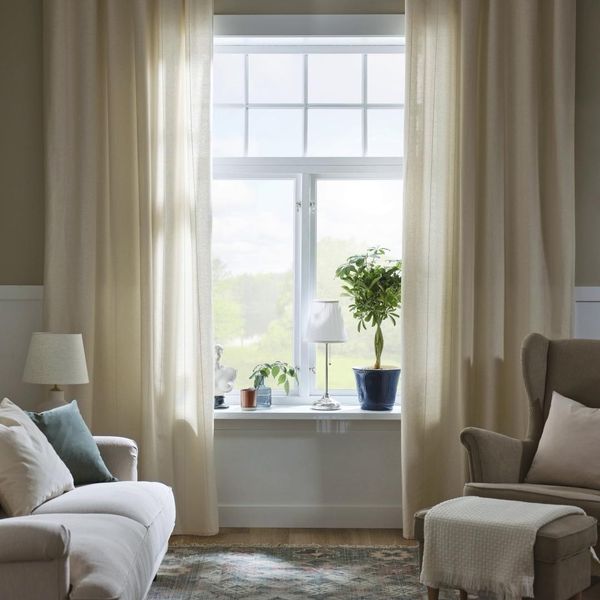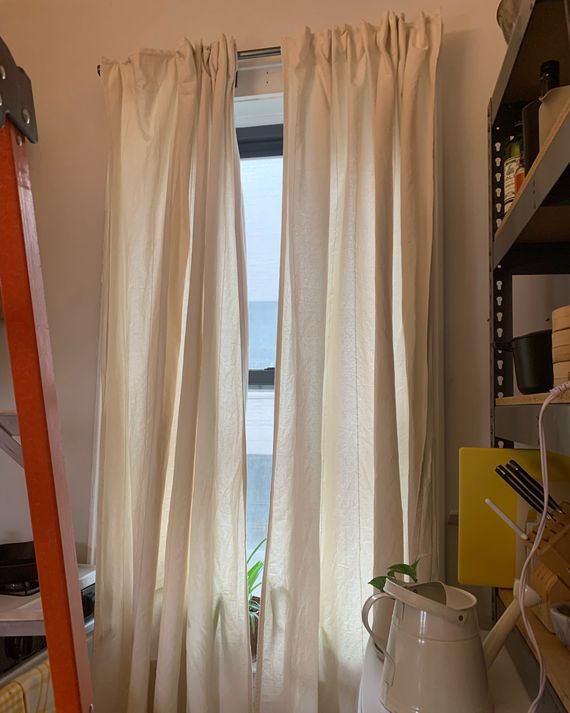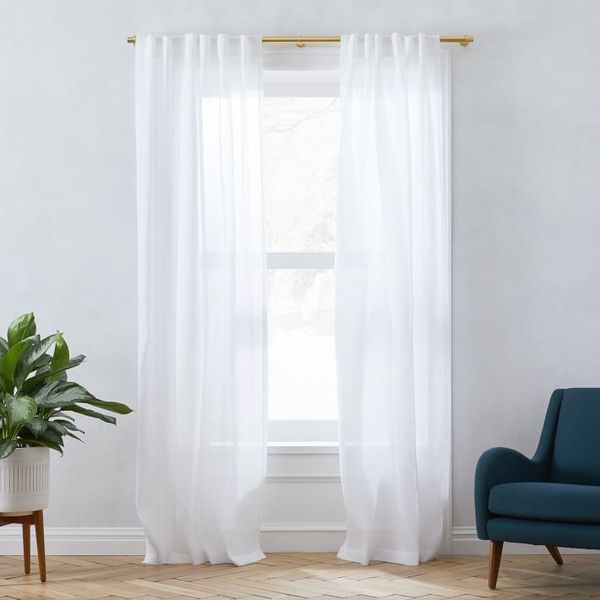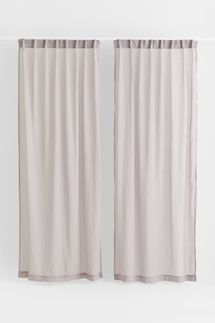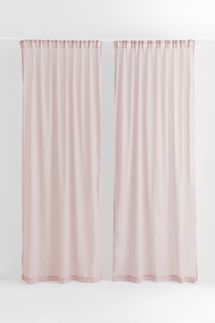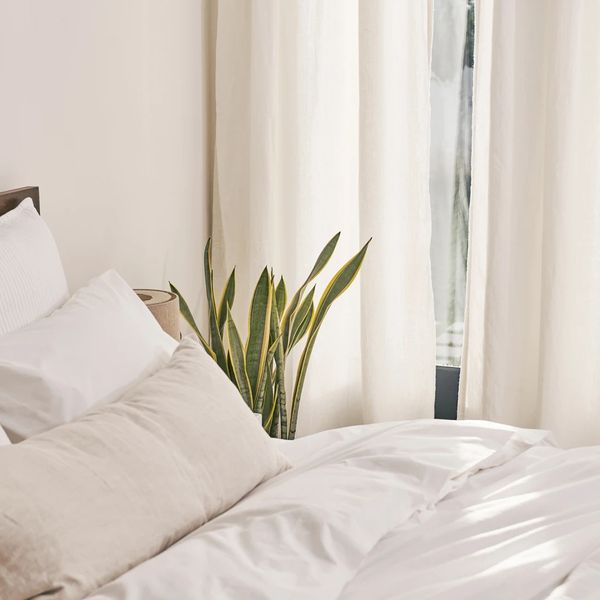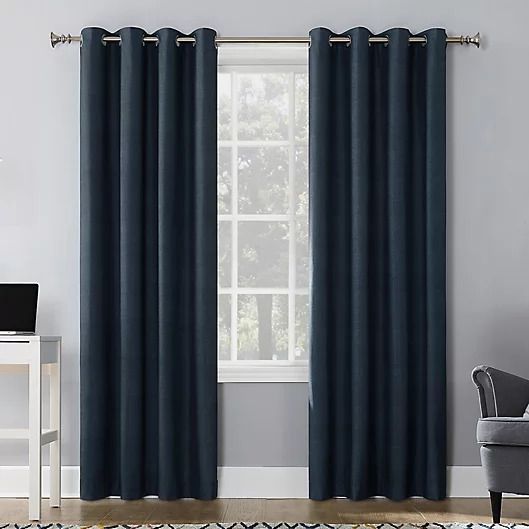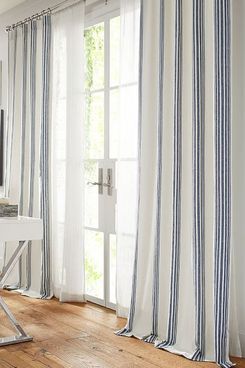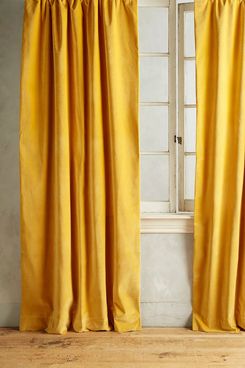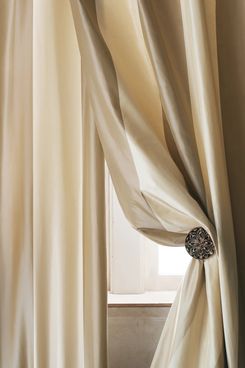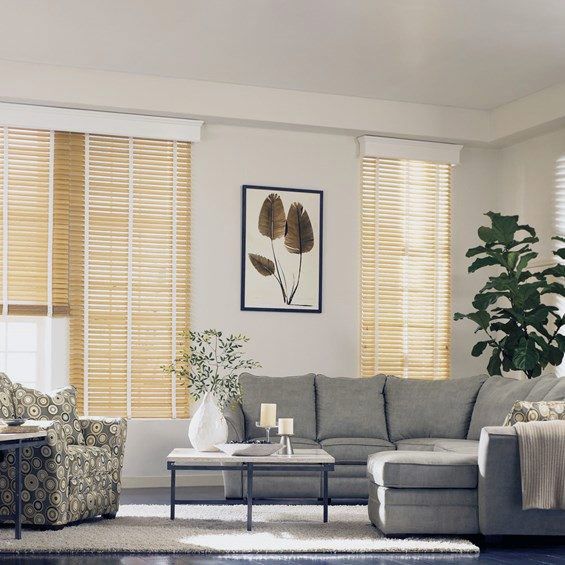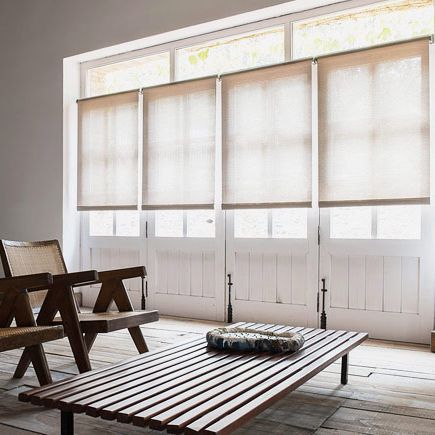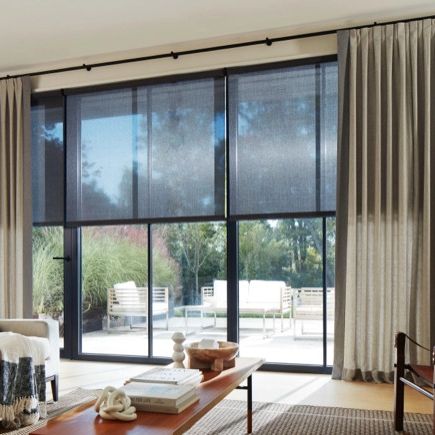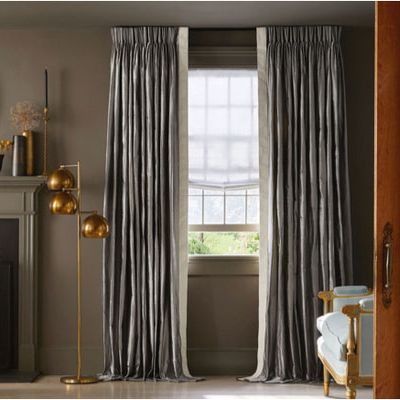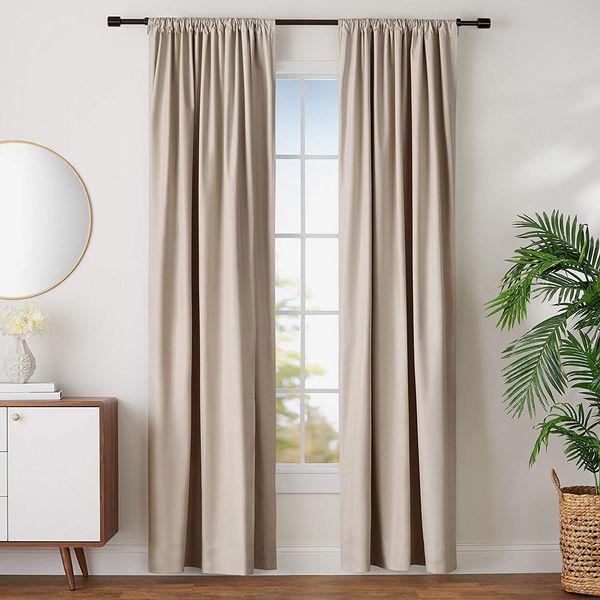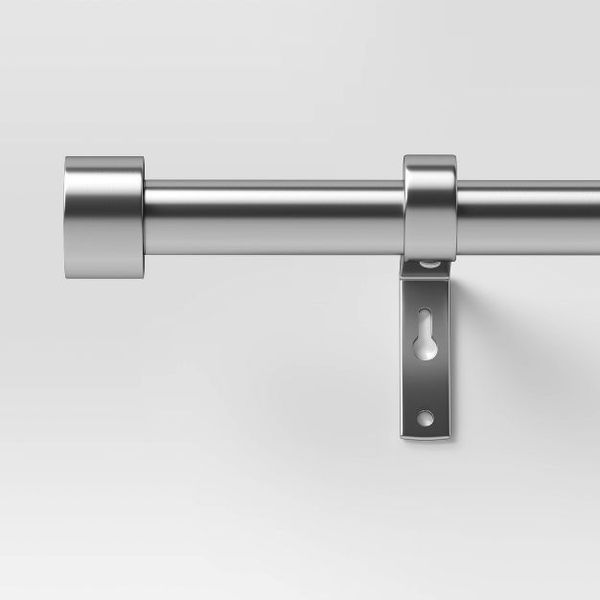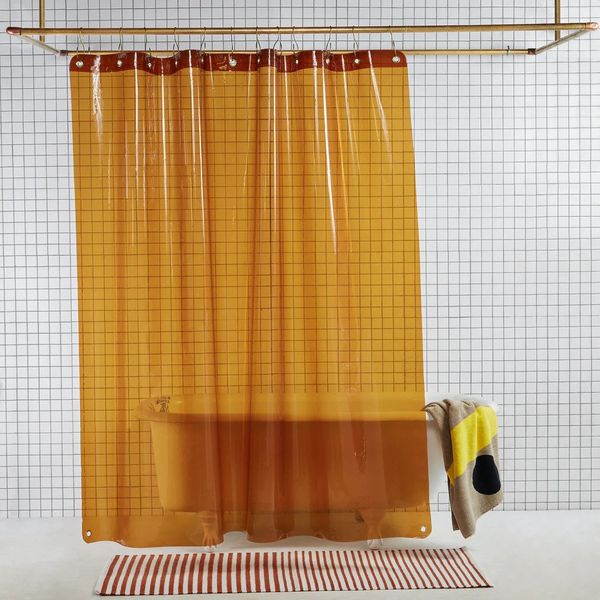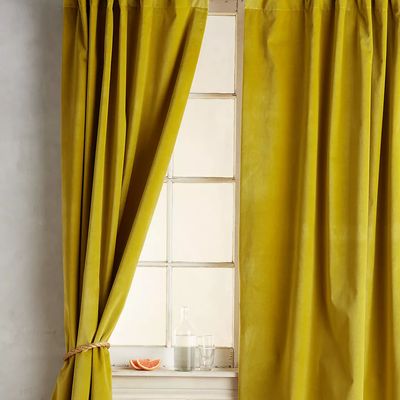
In this article
A home with lots of natural light is wonderful, but if you find yourself overheating in a midday sunbeam or making extended eye contact with pedestrians outside a ground-floor apartment, it might be time to buy curtains. Adding curtains to your windows is one of the quicker and less expensive home-improvement projects: The only additional supplies you’ll need are a curtain rod and (maybe) a drill and a ladder. And while there are some very luxe window treatments out there, there are also tons of inexpensive options that do the job well. To find the best options, I tested our best-in-class curtains in my own home and brought in advice from 12 designers and home experts.
What we’re looking for
Material
When buying curtains, choose a material you like — one that looks good during the day and night, up close and far away, gathered to the side or pulled shut. All kinds of materials can be made into curtains, but the most common are wovens with a nice drape, like cotton, linen, silk, and velvet, which are substantial enough to hold their shape but not so heavy that they sag or droop. Synthetic textiles like polyester are also used for light-blocking blackout curtains, which tend to have a stiffer silhouette.
If your curtains will hang in a high-traffic area that kicks up a lot of dust or dirt, you may need to occasionally take them down to clean them. If that’s the case, consider buying a machine-washable material, like cotton — some fabrics like linen and silk are dry-clean only. If you’re trying to lift wrinkles or need to perform a light cleaning, you can also do a quick once-over with a garment steamer with the curtains still hanging on the rod.
Opacity
Window curtains range from translucent, windswept-Italian-villa gauze to heavy fabrics optimized to block out light and heat. The right opacity depends on your needs — whether you’re aiming to diffuse bright light, preserve privacy near a street-level window, or your sleep is being interrupted by a street light that burns brighter than the sun. We’re categorizing curtains as sheer, semi-sheer (not see-through, but let in enough light to feel “like day in the daytime,” as Strategist senior writer Liza Corsillo puts it), opaque, and blackout, which often also blocks heat.
Length
Most curtains are between 48 and 50 inches wide per panel, but the length is variable. Megan Hersch, the owner of Studio MG Interiors and online interior-design service RoomLift, says that she typically hangs a curtain from the rod to the floor, “so that it just ‘kisses’ the floor. This way, nothing is dragging and trapping dirt, but they don’t look too short.” (Rods are typically mounted at the top of the window, but for very tall ceilings, Hersch recommends installing about 16 inches above the frame.) If you want a more dramatic vibe, Hersch recommends adding extra 1.5 inches so the drape “breaks” on the floor. Alternately, if you need to shorten your curtains to fit above a sill, console, or radiator, they’re fairly straightforward to hem on a sewing machine, or you can hire a tailor to help. You can also do a no-sew DIY job — Strategist senior editor Ailbhe Malone recommends Wundaweb tape in the latter case.
Header
The header is the top of the curtain, where the fabric meets the curtain rod. There are a ton of header styles, and many items on this list can be hung multiple ways, but there are two general categories — curtains that hang directly onto the curtain rod with a rod pocket, loops, or grommets, and curtains that hang slightly below it using ties, curtain hooks, or drapery pins. Some curtains are designed to do both, depending on your preference. For example, our best-in-class curtains have a rod pocket and tabs on the back, which can be hung directly on the rod or looped over curtain hooks. Hooks will take slightly longer to install, but hanging a curtain on hooks versus directly onto the rod can help it open and shut more smoothly.
Best curtains overall
Material: 100 percent cotton | Opacity: Semi-sheer | Length: 84 inches, 98 inches | Header: Rod pocket, loops
You can’t go wrong with these inexpensive, 100 percent cotton Ikea curtains, which can be hung several ways, between a few styles of hanging on the rod and affixing with hooks. I first heard about them from Strategist senior writer Liza Corsillo, who swears by them. Editorial consultant Sarah Leon, who is in the process of renovating a home in Brooklyn, also used the curtains all over a previous apartment, a “fake two-bedroom” in a converted factory. “We hung Ikea white curtains everywhere,” she says. “It was really good for acoustics, it was cheap, and it gave us a lot of hidden storage in an apartment that had no storage.”
I hung the curtains in my home, both before and after washing them, and was impressed by how substantial and high-quality they feel in general, much less for $30 curtains. The off-white color is undyed cotton, with a speckled appearance that has the same rustic vibe as linen. They pass the crucial test of looking just as good close up as far away. They do shrink a bit in the wash — about four inches after a cold wash cycle and pulling them out of the dryer while still damp — so if you’re planning to hem them, I’d recommend washing first. To remove wrinkles, I used a handheld garment steamer. Corsillo, who washes them every couple months to remove dust and radiator drips, usually irons them; even if you don’t want to pull out your iron, “they eventually flatten on their own from gravity,” she says.
Best sheer curtains
Material: 100 percent linen | Opacity: Sheer | Length: 84, 96, and 108 inches | Header: Rod pocket
For a sheer curtain that diffuses light without dimming your space, linen is my first choice — although the fabric is more expensive than cotton, the material of our best-in-class pick, the airiness and heft of linen is uniquely well-suited to curtains and is hard to find in another fabric. There are plenty of linen curtains on the market, but West Elm’s stand out as a great balance of price and reliability (the brand also makes resident bedding expert Lauren Ro’s favorite lightweight linen sheets). Strategist senior editor Simone Kitchens has used them in a street-facing window and reports that they let in plenty of sunlight. And although Kitchens had planned to wash them, she ended up not needing to: “They naturally softened and looked lived-in after a short while.”
Best (less expensive) sheer curtains
Material: 50 percent cotton, 50 percent recycled polyester | Opacity: Sheer | Length: 98, 118 inches | Header: Four-way header
For a less-expensive set of curtains that are sheerer than the Ikea option above, try H&M Home. Strategist senior editor Ailbhe Malone uses them at home, hung over a set of blinds. They “let in light when the blinds are open, but still mean people can’t peek in,” she says, and they “look far more expensive than they are.” They’re easy to install with a four-way header, which allows them to be mounted on the rod itself or hung below it with hooks, depending on your setup.
Best semi-sheer linen curtains
Material: 100 percent linen with cotton lining | Opacity: Semi-sheer | Length: 84 and 96 inches | Header: Rod pocket, loops
If you want the look of linen curtains without the see-through opacity, these cotton-lined panels from Parachute are a great option. Kitchens says that they “let light filter in nicely, but still leave you with some privacy.” They also have a very practically designed header: “a genius strip of loops sewn into the back panel, which makes connecting them to curtain rings and hooks super-easy,” says Kitchens. Parachute is a brand I trust with linen: It makes our best-in-class classic linen sheet set, and has been a staff favorite for years.
Best blackout curtains
Material: Polyester | Opacity: Blackout | Length: 63, 84, 95, and 108 inches | Header: Grommets
If you’re looking for curtains with more light-blocking capability than the Lenda cotton panels, you don’t need to splurge. Curtains from Sun Zero do the job and are relatively inexpensive and effective at blocking sunlight (they also provide insulation, to keep sunny rooms from overheating). They’re the go-to blackout curtains of Dani Mulhearn, a senior designer at online interior-design service Havenly. She likes that they’re affordable, come in a variety of neutral colors, and are available in several lengths. The grommet header is “super-functional” and makes opening and closing them easy.
Best patterned blackout curtains
Material: 55 percent linen, 45 percent cotton; polyester lining | Opacity: Blackout | Length: 84, 96, and 108 inches | Header: Rod pocket, rings
I generally favor for simpler curtain styles because I live in a tiny New York apartment, but if you’re working with a larger space or just love drama, you might want to consider a pattern. These linen-and-cotton-blend curtains are decorated with narrow, irregular-size stripes that add a “casual and coastal feel,” according to interior designer Katherine Tlapa, and have a light-blocking polyester lining. Interior designer Bachman Brown also recommends patterned curtains: “A large-scale pattern is one of the best drapery treatments you can do for a window,” he says. “It sets the tone for the room, and nothing draws your eye more than a grand-scaled fabric.”
Best velvet curtains
Material: Cotton and polyester velvet, cotton lining | Opacity: Opaque | Length: 63, 84, 96, and 108 inches | Header: Rod pocket
If you’re decidedly not looking for curtains that blend into the background, these dramatic velvet panels from Anthropologie are a great pick. Megan Huffman, a designer with the online interior-design service Modsy, recommends velvet curtains, especially these light-blocking matte velvet panels from Anthropologie that come in a range of colors from goldenrod to navy blue. The opposite of breezy and sheer, they’re both sumptuous and functional, with the fabric’s dense pile and substantial feel serving to block light as well as dampen sound.
Best silk curtains
Material: 100 percent silk with cotton lining | Opacity: Opaque | Length: 96, 108, and 120 inches | Header: Rod pocket, includes drapery hooks
Another luxe, eye-catching pick are these dramatic cabana-striped silk curtains, which came up in our investigation of the best window treatments according to designers. They have a cotton lining to block light, come in a range of colors, and would make your space feel like a rococo parlor.
Best blinds
Material: Hardwood, cloth tape | Opacity: Adjustable| Length: 12 to 120 inches | Header: Mounted to wall
In a smaller space, even sheer or lightweight curtains can feel obtrusive; if that’s the case, wooden blinds are great a great option. They’re “both budget-friendly and chic,” says interior designer Jessica Stambaugh. This set from Home Depot is versatile and a great deal. They’re made of North American hardwood and are extremely customizable — you can specify measurements down to the inch, from 12 to 120 inches in length, and the slats come in 34 different finishes, from natural wood to deep walnut and a gray shade called “smoked oyster.”
Best splurge-y custom curtains
Material: Custom fabric | Length: Custom size | Header: Drapery pins
If you want to splurge on customizing everything about your drapery, from color and material down to header style, interior designers mentioned Shade Store over and over again as their go-to source. Their roller shades are a less-expensive, unobtrusive option (“An overtreated window can feel dated. For a more understated window, go for a solid color roller shade,” says interior designer Jenny J. Norris, who uses them in her own home). Designer Betsy Burnham especially likes their solid-color linens with inverted pleat drapery, which she favors for a “tailored feel.” For custom curtains with a more classic pleated look, Alyssa Kapito suggests a pinch pleat: “It’s not too traditional and not too modern,” she says.
Some more curtains and rods we’ve written about
Our experts
• Bachman Brown, interior designer
• Betsy Burnham, interior designer
• Liza Corsillo, Strategist senior writer
• Nicole Fuller, interior designer
• Megan Hersch, owner of Studio MG Interiors
• Megan Huffman, interior designer
• Alyssa Kapito, interior designer
• Simone Kitchens, Strategist senior editor
• Ailbhe Malone, Strategist senior editor
• Dani Mulhearn, senior designer at Havenly
• Katherine Tlapa, interior designer
• Emma Wartzman, Strategist writer
Additional reporting by Miranda Agee and Lauren Ro
The Strategist is designed to surface the most useful, expert recommendations for things to buy across the vast e-commerce landscape. Some of our latest conquests include the best acne treatments, rolling luggage, pillows for side sleepers, natural anxiety remedies, and bath towels. We update links when possible, but note that deals can expire and all prices are subject to change.

